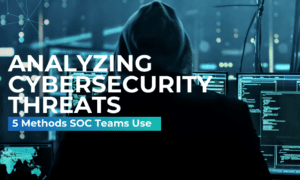In today’s hyper-digital world, cybersecurity is no longer a choice—it’s an absolute necessity. As we move into 2025, the digital landscape is evolving rapidly, and so are the threats that come with it. Businesses, regardless of their size or industry, are increasingly dependent on digital tools, cloud computing, and remote operations. With that reliance comes a heightened risk of data breaches, ransomware attacks, phishing schemes, and insider threats.
Cybersecurity services have become the first and most important line of defense against these growing risks. From securing sensitive client data to maintaining compliance with regulatory standards, businesses are discovering that investing in robust cybersecurity isn’t just about preventing attacks—it’s about future-proofing their entire operation.
Cyber Threats Are More Sophisticated Than Ever
Cybercriminals have leveled up. In 2025, we’re not just talking about lone hackers operating from a basement. Instead, we’re facing well-funded, highly coordinated groups capable of executing complex attacks. AI-powered phishing campaigns, deepfake impersonations, and ransomware-as-a-service are just a few examples of how sophisticated the threat landscape has become.
To counter these threats, cybersecurity services are leveraging next-gen tools like machine learning, behavioral analytics, and zero-trust architecture. But even the best technology requires a skilled team behind it to interpret, respond, and act in real-time.
Regulatory Pressure is Mounting
As digital security becomes a major concern globally, governments and industry regulators are tightening their standards. Companies in sectors such as finance, healthcare, and legal services are especially under the microscope. Non-compliance can lead to stiff penalties, reputational damage, and even legal action.
That’s why many firms now see cybersecurity services not only as a protective measure but as a compliance strategy. Proactive risk assessments, real-time monitoring, and policy enforcement help businesses meet increasingly complex regulatory requirements while keeping data safe.
Importance of Incident Response and Preparedness
One of the key elements of a strong cybersecurity posture in 2025 is not just preventing incidents—but responding to them effectively. This is where Incident Response and Tabletop Exercise Services for RIAs come into play. These services help organizations simulate attack scenarios, uncover vulnerabilities, and develop fast, coordinated responses when the real thing happens.
It’s one thing to have a firewall and antivirus; it’s another to be prepared for when those defenses are bypassed. Tabletop exercises, for instance, allow teams to rehearse and refine their roles in a crisis. It’s not about if a breach happens anymore—it’s about when, and how well you’re prepared to handle it.
The Role of Human Error in Breaches
Despite all the technology and automation available, human error remains one of the biggest culprits behind cybersecurity breaches. Clicking on a malicious link, misconfiguring a server, or using a weak password can open the door to attackers.
Modern cybersecurity services incorporate ongoing employee training and awareness programs to reduce these risks. From phishing simulations to access control policies, educating your team is just as crucial as having the right tech stack.
Cybersecurity and Business Continuity
In the event of a cyberattack, time is money. Every second your systems are down can mean lost revenue, damaged trust, and compromised data. Cybersecurity today isn’t just about stopping hackers—it’s about ensuring your business keeps running.
A big part of this involves IT Consulting, which provides tailored advice and solutions to help businesses align their cybersecurity strategies with operational goals. From cloud migration to data backup planning, consulting services make sure security and productivity go hand-in-hand.
Moreover, with cyber insurance becoming more prevalent, many insurers now require documented cybersecurity protocols before issuing policies. A well-structured cybersecurity plan supported by expert consultation can actually save businesses money in the long run.
The Rise of Remote Work and Cloud Infrastructure
Remote and hybrid work models are here to stay. While convenient, they also open up new vulnerabilities—especially when employees access sensitive data from personal devices or unsecured networks. Similarly, widespread cloud adoption, while scalable and efficient, comes with its own set of security challenges.
That’s where cybersecurity services prove invaluable. From implementing secure VPNs to enforcing multi-factor authentication and endpoint protection, they ensure your distributed workforce doesn’t become a liability. Centralized visibility and access control are now critical, especially as perimeters continue to dissolve.
Cybersecurity as a Competitive Advantage
Let’s face it—clients, customers, and partners are becoming more security-conscious. In 2025, demonstrating a strong cybersecurity posture can actually give your business a competitive edge. When you can show that you take data protection seriously, you build trust—and in the digital age, trust is currency.
Smart companies are already promoting their commitment to cybersecurity in client pitches and stakeholder reports. Whether you’re a service provider, SaaS platform, or eCommerce brand, emphasizing your security practices can be the difference between winning or losing business.
Managed Detection and Response (MDR)
One of the most in-demand cybersecurity services in 2025 is Managed Detection and Response. MDR combines the power of 24/7 threat monitoring, threat hunting, and incident response in a single, streamlined service. It allows organizations to quickly identify and contain threats before they cause serious damage.
With MDR, businesses don’t have to build a security operations center (SOC) from scratch. Instead, they can outsource this function to experts who have the tools and experience to act fast. It’s scalable, cost-effective, and ensures your defenses are always on high alert—even while you sleep.
Third-Party Risks and Vendor Management
It’s not just your internal network you need to worry about. Many breaches now occur through third-party vendors and contractors with insufficient security measures. In 2025, managing supply chain and vendor risk is more important than ever.
Advanced cybersecurity services include vendor risk assessments, contractual security clauses, and continuous monitoring of third-party access. This layered approach ensures that even if your vendor is targeted, your organization stays protected.
Data Privacy and Customer Expectations
Consumers are becoming savvier about data privacy. They want to know what you collect, how you store it, and how you use it. Failing to meet these expectations doesn’t just risk regulatory action—it can lose you business.
This is why cybersecurity and data privacy are so tightly intertwined in 2025. Encryption, secure APIs, data minimization, and access controls are all part of a well-rounded security strategy. Businesses that can clearly communicate their privacy practices, backed by real cybersecurity infrastructure, are more likely to earn long-term loyalty.
Cybersecurity Services are a Strategic Investment
Let’s bust a myth—cybersecurity services aren’t just an expense. They’re a strategic investment that protects your assets, enables growth, and ensures compliance. With threats evolving by the day, putting off cybersecurity is like leaving your front door open and hoping no one walks in.
Organizations are waking up to the fact that cybersecurity is not just the IT department’s job—it’s a company-wide priority. From the C-suite to the help desk, everyone has a role to play. And with expert partners and the right resources, it’s more achievable than ever.
Don’t Wait Until It’s Too Late
In the past, many businesses only invested in cybersecurity after a breach. In 2025, that reactive mindset is far too risky. The stakes are higher, the threats are smarter, and the impact is deeper.
Investing in cybersecurity services now can mean the difference between a minor incident and a catastrophic breach. Whether it’s developing an incident response plan, assessing vulnerabilities, or training staff, proactive action always beats damage control.
Final Thoughts: Security is the New Standard
We live in a digital-first era where data is power—and power needs to be protected. Cybersecurity isn’t just a tech issue anymore; it’s a business imperative.
For companies that want to build trust, stay compliant, and protect their future, the message is clear: Don’t treat cybersecurity as optional. Treat it as essential.
Those that invest in cybersecurity services today are not only securing their networks—they’re securing their reputation, their clients, and their peace of mind.
Read More From Techbullion



































